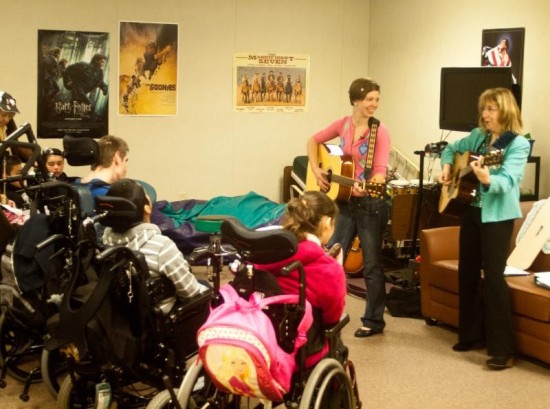Frequently Asked Questions
What is Music Therapy?
Music Therapy is the clinical and evidence-based use of music interventions to accomplish individualized goals within a therapeutic relationship by a credentialed professional who has completed an approved music therapy program. (American Music Therapy Association definition, 2005)
Music Therapy is an established health profession in which music is used within a therapeutic relationship to address physical, emotional, cognitive, and social needs of individuals. After assessing the strengths and needs of each client, the qualified music therapist provides the indicated treatment including creating, singing, moving to, and/or listening to music. Through musical involvement in the therapeutic context, clients’ abilities are strengthened and transferred to other areas of their lives. Music therapy also provides avenues for communication that can be helpful to those who find it difficult to express themselves in words. Research in music therapy supports its effectiveness in many areas such as: overall physical rehabilitation and facilitating movement, increasing people’s motivation to become engaged in their treatment, providing emotional support for clients and their families, and providing an outlet for expression of feelings.
Who is qualified to practice music therapy?
A qualified music therapist must complete a comprehensive four-year baccalaureate program in addition to a 1,040 hour internship. Course work includes: music therapy principles and practice, applied music, music theory and history, psychology, sociology, biological and physical sciences, research and fieldwork. Upon completion of the undergraduate degree, a music therapist is eligible to sit for the board certification exam in order to hold the Music Therapist-Board Certified credential (MT-BC). In the state of Wisconsin, music therapists can also be registered with the Department of Regulation and Licensing with the credential of WMTR.
In addition, The National Music Therapy Registry lists qualified music therapy professionals with the following designations: RMT, CMT, ACMT. These individuals have met accepted educational and clinical training standards and are qualified to practice music therapy until the year 2020. After that time, MT-BC will be only acceptable entry-level credential.
Is there research to support music therapy?
Journal of Music Therapy and Music Therapy Perspectives are peer review journals published by the American Music Therapy Association. They provide research supporting various effective music therapy interventions and techniques. The Center for Biomedical Research in Music also does extensive research and posts a detailed bibliography on their website.
What is a typical music therapy session like
Music therapy is individualized treatment; therefore sessions are designed based on the needs of the client. Goal areas may include developing motor skills, improving communication skills, encouraging cognitive or academic development, providing sensory stimulation, assisting with pain management, or addressing psychological needs of a client. Music therapy techniques may include but are not limited to: vocalization, instrumental involvement, improvisation, movement, song writing, instructional songs, music listening, discussion, and relaxation techniques.
How is music therapy funded?
Some insurance companies allow music therapy services to be reimbursed. Wisconsin has many state waivers that will cover services such as the Autism Waiver, Children’s Long Term Support Waiver, Family Support, and Family Care. Grants and private pay are other common ways to fund music therapy.
I’ve heard about other therapeutic music professionals. What is different about music therapy?
Other music professionals such as Certified Music Practitioners, Harp Therapists and Certified Music Thanatologists offer a valuable service. There are several differences such as the amount of training, level of supervision during training, target clientele, and instruments or repertoire used in clinical settings. A comparison table can be found by clicking here.
Music therapists are certified by the Certification Board for Music Therapists which is regulated by an independent and nationally-recognized accrediting agency, the National Commission for Certifying Agencies. Music therapy is also the only therapeutic music profession recognized by the American Medical Association, and as such is the only one that is potentially insurance reimbursable.
Links for Additional Music Therapy Information
National Board Certification and State Registration
Certification Board for Music Therapist
State of Wisconsin Department of Regulation & Licensing
Music Therapy Organizations – National, Regional, World
American Music Therapy Association (AMTA)
Great Lakes Region (of AMTA)
World Federation of Music Therapy
Wisconsin Music Therapy Degree Programs – Milwaukee Area
Alverno College – Undergraduate – Graduate
Carroll University – Undergraduate


